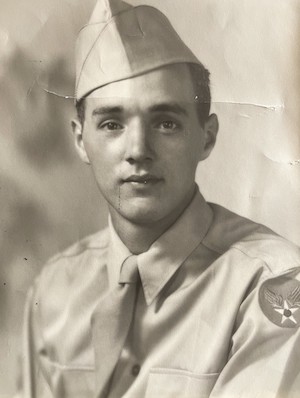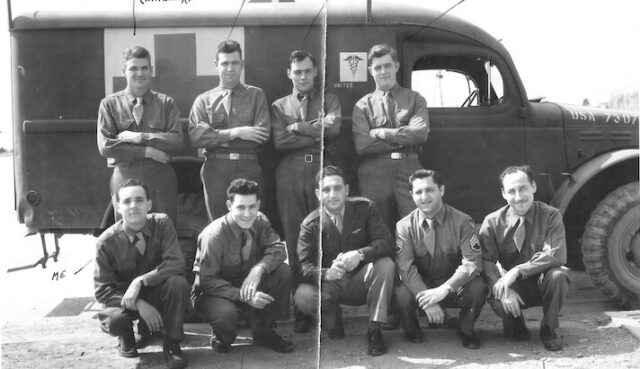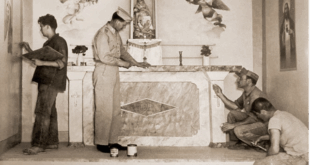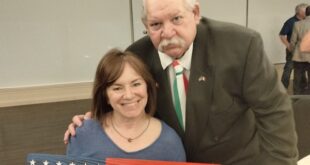Trained initially as a typist and eventually as a medic, Emil Garippo witnessed firsthand the devastating impact of World War II as the battle raged down the road.
Emil Garippo passed away on Aug. 21. The following article is based on an interview conducted on Aug. 8 and is published in his memory.
Born in Chicago on April 1, 1923, Emil Garippo was the middle child of Emil and Jessie Tarsitano Garippo. The family lived on Arthington Street in Chicago’s Taylor Street Little Italy.
Garippo’s paternal grandparents, from the area around Naples in Italy, and the Tarsitanos, from Calabria, lived next door to one another. Garippo grew up among grandparents, aunts, uncles and cousins. “We had three houses, and all the family lived in them on Arthington Street,” he recalled.
Garippo’s maternal grandmother ran the family grocery store, Tarsitano’s, and as a boy, he helped make Italian sausage. “I worked for her in the store all the time,” he said. “I used to put the stuff on the shelves.” Customers bought bread at the corner bakery and brought it to his grandmother, who made delicious sandwiches. Right next door, his paternal grandmother ran the neighborhood candy store.
Garippo attended Guardian Angel Elementary School and St. Patrick High School. He was working at an accounting firm when he was drafted into the U.S. Army Air Forces in 1943. “I was ready,” he said. “Everybody was learning to be a part of World War II.”
 He had basic training at Camp Grant and then went to the University of Louisiana to learn typing and other office work. After completing the eight-week course, Garippo was assigned to the 397th Bomb Group, 597th Bomb Squadron, and dispatched to Florida for training as a medic.
He had basic training at Camp Grant and then went to the University of Louisiana to learn typing and other office work. After completing the eight-week course, Garippo was assigned to the 397th Bomb Group, 597th Bomb Squadron, and dispatched to Florida for training as a medic.
While stationed in Florida, not only did Garippo learn to be a medic, he also took care of soldiers at the base, tending to their illnesses and injuries. A gruesome part of his job was the recovery of soldiers killed during training maneuvers. In one incident, a plane carrying six soldiers crashed into Tampa Bay, killing all on board. Garippo plunged into the swampy mud to reach the soldiers. “Oh, I didn’t sleep for a day or two after I picked up those six guys,” he said.
There were several plane crashes while Garippo was in Florida. He estimates he recovered about 50 bodies. “I picked up guys all the time,” he said. “They would call me whenever an airplane crashed or they needed a medic.”
After eight months, Garippo boarded a troop ship across the Atlantic headed for Europe. The ship traveled in a convoy, but it developed engine trouble and was stranded for several days until repairs could be made. “They left us there, and submarines were all over the place. I thought we were dead,” he said.
The ship landed in Scotland, and Garippo eventually went to England. He was in London when the Germans launched their V1 missiles and V2 rockets. The V1 was a flying bomb that sounded “like a motorboat — brrrrr — and then it stopped and came down. I was just hoping that it didn’t hit my block right there,” Garippo said. “Those poor people. They suffered a lot.”
Nine days after D-Day, Garippo crossed the English Channel and landed on Omaha Beach. “Oh, there were soldiers all over the place, some dead,” said Garippo. He and the other medics triaged the casualties and sent them to doctors in the field hospital. As he advanced on foot through the countryside of France, Belgium and on into Germany, Garippo encountered wounded soldiers left behind by forward-moving infantry troops. He tended to their injuries, administered first aid and got them transported for further help. “I did whatever was necessary,” he said, “whatever I could.”
Along the way, he witnessed the horrors of war: cities and towns lying in ruins and civilians living in bombed-out houses. “People were worried about buying things,” Garippo said. “It was hard to get food.”
Although as a medic, he was technically a noncombatant, Garippo did have a couple of close calls. He was standing at the end of a pier when a German soldier shot at him and missed. “That was the only time,” he said. “I felt like I was lucky.” Garippo also recalled sheltering in a foxhole as German planes dropped bombs overhead. “I was worried,” he said.
Garippo was stationed in Europe from June 1944 until the war in Europe ended. He wrote to his parents as often as possible and to his brother, Michael, also in the European theater. In a letter from home, his father wrote: “We are saddened by Mike’s misfortune.” Garippo wondered what that meant. “It took me three or four weeks to learn that ‘misfortune’ meant he was killed,” Garippo said.
One year older than Emil, Michael had been studying to be a lawyer when soldiers came to the university. “They took all the boys and put them in the Army infantry,” said Garippo. “Those dirty rats!” Garippo was in France when he learned of his brother’s death and found out that he was at Margraten Cemetery in Holland. Twice, he hitched a ride to Margraten to visit the gravesite with Michael Garippo written on it. “It was terrible, terrible,” he said.
While visiting the cemetery, Garippo saw two trucks come in carrying about 50 dead soldiers in body bags, and the men began burying them. “Oh, I felt pretty bad,” Garippo said. “The poor guys: 19, 20 years old!”
Michael was killed in Belgium in December 1944, but not before his courage led to the capture of 30 German soldiers. He had been flushing them out of a pillbox when he was shot by a German soldier hiding in a tree. “They took those boys from college, and they put them in the infantry, and (the enemy) killed them,” said Garippo. “My brother was a hero!” Michael was posthumously awarded the Silver Star.
Garippo was in the south of Germany when the war in Europe ended in May 1945. He was sent to France and was preparing to head to Japan when he was sent back to the United States because of the points system. “I had 90 or so points,” he said. “I was one of the first guys to come home.”
Sergeant Garippo was discharged in 1945, returned to Chicago and married Dorothy “Dean” Rugg (shortened from Ruggeri) in 1946. He attended DePaul University on the G.I. Bill. The first in his family to graduate from college, Garippo earned both a bachelor’s and master’s degree in education. He taught in Chicago Public Schools, was an assistant principal at Spaulding High School and later moved to the Bureau of Transportation. A widower, Garippo had three children, four grandchildren and two great-grandchildren.
Garippo remembered landing on Omaha Beach, trudging through to Germany and seeing bodies on the ground. “Those poor guys,” he said. “I was lucky! I came home!”
The above appears in the November 2023 issue of the print version of Fra Noi. Our gorgeous, monthly magazine contains a veritable feast of news and views, profiles and features, entertainment and culture. To subscribe, click here.
 Fra Noi Embrace Your Inner Italian
Fra Noi Embrace Your Inner Italian






